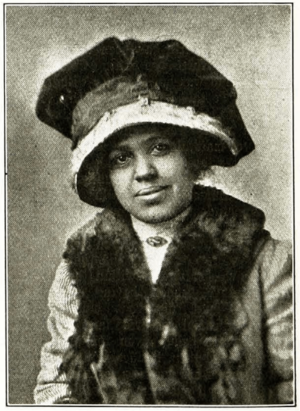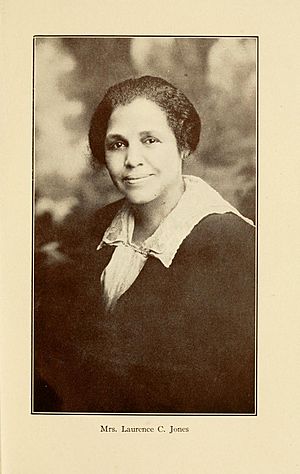Grace Morris Allen Jones facts for kids
Quick facts for kids
Grace Morris Allen Jones
|
|
|---|---|
 |
|
| Born | 7 January 1876 |
| Died | 2 March 1928 |
| Resting place | Piney Woods |
| Education | Burlington High School, University of Iowa, Chicago Conservatory of Music |
| Occupation | Educator, school founder, fundraiser, postmaster, clubwoman, reformer, and writer |
| Employer | Piney Woods Country Life School |
| Organization | Mississippi State Federation of Colored Women’s Clubs |
| Spouse(s) | Laurence C. Jones |
| Children | Laurence Jr., Turner, and Helen |
Grace Morris Allen Jones (born January 7, 1876 – died March 2, 1928) was an amazing African American woman. She was a teacher, started schools, and helped raise money for important causes. She also worked to make things better for people, especially women and children. Grace was very important to the success of the Piney Woods Country Life School in Mississippi, which she ran with her husband, Laurence C. Jones. She even started her own training school in Burlington, Iowa.
Contents
Grace's Early Life
Grace Morris Allen Jones was born in Keokuk, Iowa on January 7, 1876. Her parents were James Addison Morris and Mary Ellen Morris. Grace's family was educated and had a good life.
Her grandmother, Charlotta Gordon Pyles, was an abolitionist. This means she worked to end slavery. Grace later wrote an article about her grandmother's escape from slavery. The article also told how Charlotta helped other enslaved people become free.
In 1891, Grace made history. She was the first African American to graduate from Burlington High School. People believe she also graduated from the University of Iowa. Grace was known as 'the Sunday school girl of Iowa' because she was very active in Sunday schools. She also started the first kindergarten in Burlington that welcomed all children, no matter their race.
After getting her teaching certificate, Grace taught for three years in Missouri. She taught at schools in Bethel and Slater. In 1902, she returned to Burlington. There, she started the Grace M. Allen Industrial School for African American youth. The school had both Black and white teachers. Even though it was for African American students, white students also attended because it was so successful.
After her school closed in 1906, Grace studied public speaking. She went to the Chicago Conservatory of Music. She then worked as a fundraiser and public speaker. She helped raise money for education at places like the Ambidexter Institute and Eckstein-Norton Normal and Industrial Institute.
Marriage and the Piney Woods School
Grace married Laurence C. Jones in Iowa City in 1912. She became an Executive Secretary and English teacher at the Piney Woods Country Life School. Grace and Laurence had met years before when he gave a speech in Iowa. They reconnected later.
Laurence Jones wrote about his first impression of Grace. He said she was the "brightest and most enthusiastic little woman of my race." He felt sure they would meet again. And they did!
Grace was very important to the school's success. Laurence said that because of her "energy and skill, her devotion and enthusiasm," they achieved a lot. The Piney Woods School taught both regular school subjects and job skills. Students learned cooking, sewing, gardening, carpentry, and more. The school had many acres of land and several buildings.
The community loved Grace. They called her 'The Sunshine Lady of the Piney Woods'. Grace and Laurence started their married life in a small log cabin. They later moved into different rooms at the school. Finally, in 1922, they moved into a comfortable cottage. They called it the Community House because it was used for many meetings and gatherings.
Grace and Laurence had two sons, Laurence Jr. and Turner Harris. They also adopted a daughter, Helen Elizabeth. Helen later became a famous jazz musician.
Raising Money for Piney Woods
Grace was very good at raising money. She saw that many students at Piney Woods couldn't afford tuition. So, she went on lecture tours across the United States to collect money for the school.
During these tours, Grace and Laurence often faced unfair treatment. They were sometimes refused service in restaurants because of their race.
Grace started a singing group called the Cotton Blossom Singers. This group was made up of students from Piney Woods. They toured the country, performing and raising money for the school. Grace believed this would help the students use their talents and see the country. After their performances, they would tell the story of Piney Woods. Then, people would donate money.
The money raised helped build better places for students to live. It also bought school supplies, food, and clothes for those who needed them. In 1927, Grace led an eighteen-month tour. They traveled from California to New England and raised thousands of dollars. The Cotton Blossom Singers continued to tour even after Grace passed away.
Helping the Community
Grace did more than just teach and raise money. She also started clubs for women at Piney Woods. These Mothers’ Clubs helped women learn about raising children, cooking, and crafts.
Grace was also the President of the Mississippi State Federation of Colored Women's Clubs from 1918 to 1923. In this role, she helped raise money to fix the Old Folks Home in Vicksburg, Mississippi. She also served as a trustee for the home. Grace was also President of the Women's Christian Union. In 1925, she worked for the National Association of Colored Women’s Clubs.
Grace worked hard to make life better for women and children of color. She used women's clubs to promote education and improve child care. She also worked to change prisons in Mississippi. She helped build a reform school for Black youth. This school, the Margaret Murray Washington Home for Delinquent Youths, kept young people out of adult prisons.
Grace also successfully worked with the Mississippi Board of Education. She helped make sure that African American history was taught in schools. She also helped get state money for libraries in African American public schools. And she helped start a school for blind Black students.
Grace's Legacy
Grace Morris Allen Jones passed away in 1928 from pneumonia. An article in The Annals of Iowa said she had a great influence for good during her active life. Laurence C. Jones said that her worth was "too great to be fashioned into words." He believed that only the lives of those she helped could truly show her impact.
 | Calvin Brent |
 | Walter T. Bailey |
 | Martha Cassell Thompson |
 | Alberta Jeannette Cassell |


